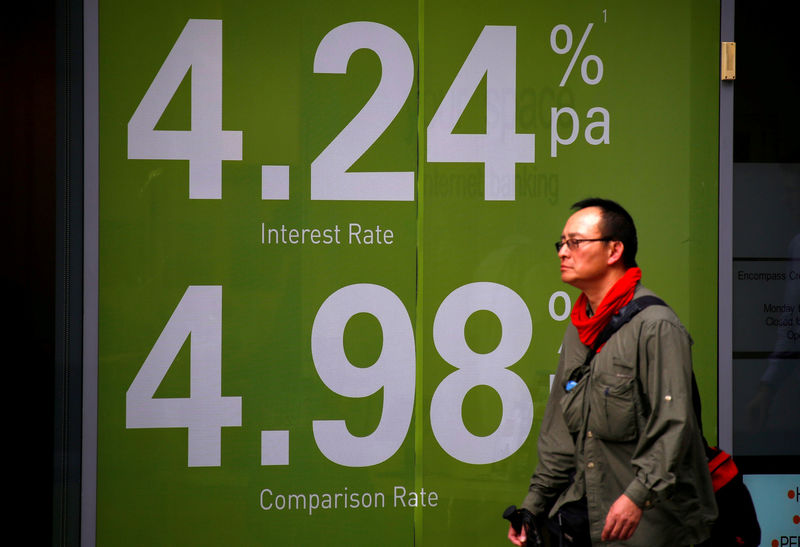* RBA cuts cash rate to 0.25% in an emergency decision
* Sets target for 3-year bond yield at 0.25%
* Yield on 3-year govt bonds eases, but still above target
* Moves aimed at lowering funding costs, provision of cheap credit (Adds move by Australia's prudential regulator in para 20)
By Swati Pandey
SYDNEY, March 19 (Reuters) - Australia made a historic foray into quantitative easing on Thursday and said it would do "whatever is necessary" to ensure funding costs are low and credit is freely available as the coronavirus pandemic jolts businesses.
Following an out-of-schedule meeting, the Reserve Bank of Australia (RBA) reduced its cash rate to an all-time low of 0.25% and said the board would not tighten policy until it achieves its employment and inflation goals.
It also set a target for the yield on three-year Australian government bonds at around 0.25%, which it plans to achieve by purchases in the secondary market beginning Friday.
"Really nothing is off the table," RBA Governor Philip Lowe said in Sydney after giving a speech on the newly announced measures.
"We are in extraordinary times and we're prepared to do whatever is necessary to make sure funding costs in Australia are low and the supply of credit is there for Australian businesses and households."
The announcement helped push three-year yields AU3YT=RR to 0.35% from 0.589% before the RBA's decision, though they were still higher than the new target.
The moves also helped lift the Australian dollar AUD=D3 after it briefly collapsed to $0.5510, the lowest since late 2002. It was last down 0.16% at $0.5758. AUD/
The RBA's stimulus follows an unprecedented step up in global co-ordination by central banks, governments and regulators since the start of this week to cushion the impact of the coronavirus.
The U.S. Federal Reserve on Sunday slashed key rates by 100 basis points, boosted asset purchases and flushed the system with liquidity. A number of other major central banks have followed suit.
Australia's A$2 trillion ($1.11 trillion) economy has had a near 30-year dream run without recession, thanks in part to rapid growth in Chinese demand for commodities and a housing market boom.
It was also able to emerge from the 2008-2009 global financial crisis relatively unscathed, allowing its central bank to spurn unorthodox monetary policies adopted by many of its developed world peers during that period.
But the coronavirus now hangs heavy over the outlook with economists at major banks predicting the country would slide into recession in the first half of this year.
Australia has recorded around 600 coronavirus infections and six deaths and officials are growing anxious about the prospect of an exponential rise in cases. a sign of the problems, Australian flag carrier Qantas Airways Ltd QAN.AX on Thursday told most of its 30,000 employees to take leave and ceased international services. said the cash rate was likely to stay at 0.25% for three years, adding Australia needed to steel itself for a rise in unemployment in coming months.
"We are not going to see much job hiring and the reality is we will see quite a few job losses," he said.
INJECTIONS
The RBA's stimulus includes a three-year funding facility for at least A$90 billion to the country's banks at a fixed rate of 0.25%. Lenders will be able to obtain initial funding of up to 3% of their existing outstanding credit.
The facility will be enhanced if banks boosted lending to businesses, especially to small- and medium-sized enterprises, the RBA added.
Australia's prudential regulator also loosened its capital requirements to enable banks to lend more freely. a separate statement, the government said it would buy A$15 billion of residential mortgage-backed securities and other asset backed securities over the next 12 months.
This is on top of the A$17 billion of fiscal stimulus already announced. with the RBA's lending package, that would pump more than A$100 billion into the economy.
Lowe also called for more government stimulus, which was echoed by economists.
"The best response to COVID-19 remains a fiscal one, supported by liquidity measures," said Callam Pickering, APAC economist at global job site Indeed.
He noted scope to expand the support offered to banks and even buy longer-term government bonds.
Earlier, the RBA used its daily market operation to pump a record A$12.7 billion into the banking system, aiming to ease liquidity constraints in a stressed bond market. ($1 = 1.7979 Australian dollars)
